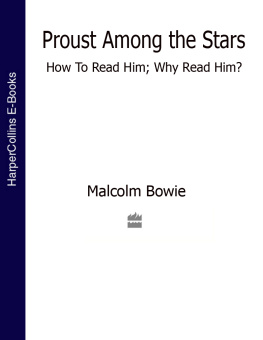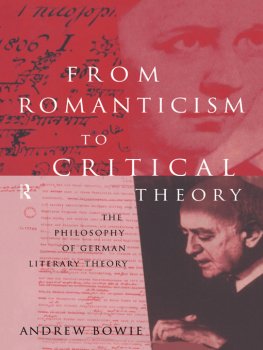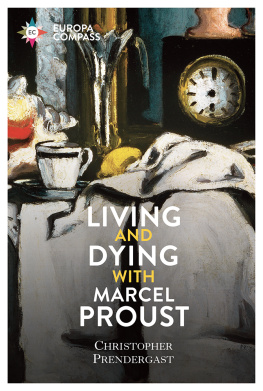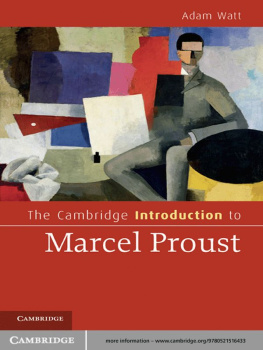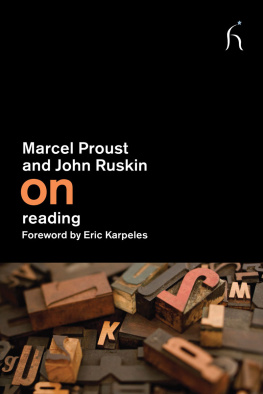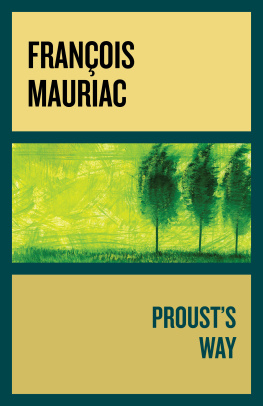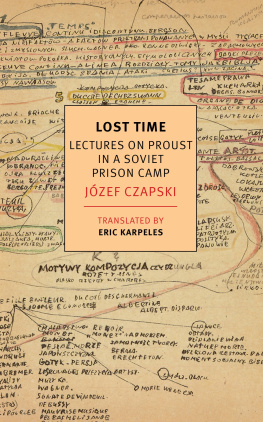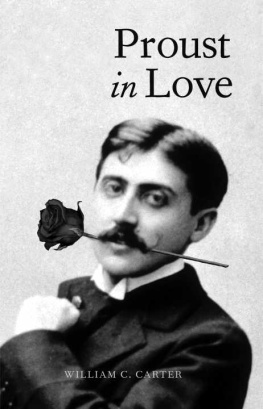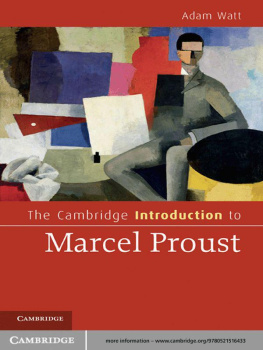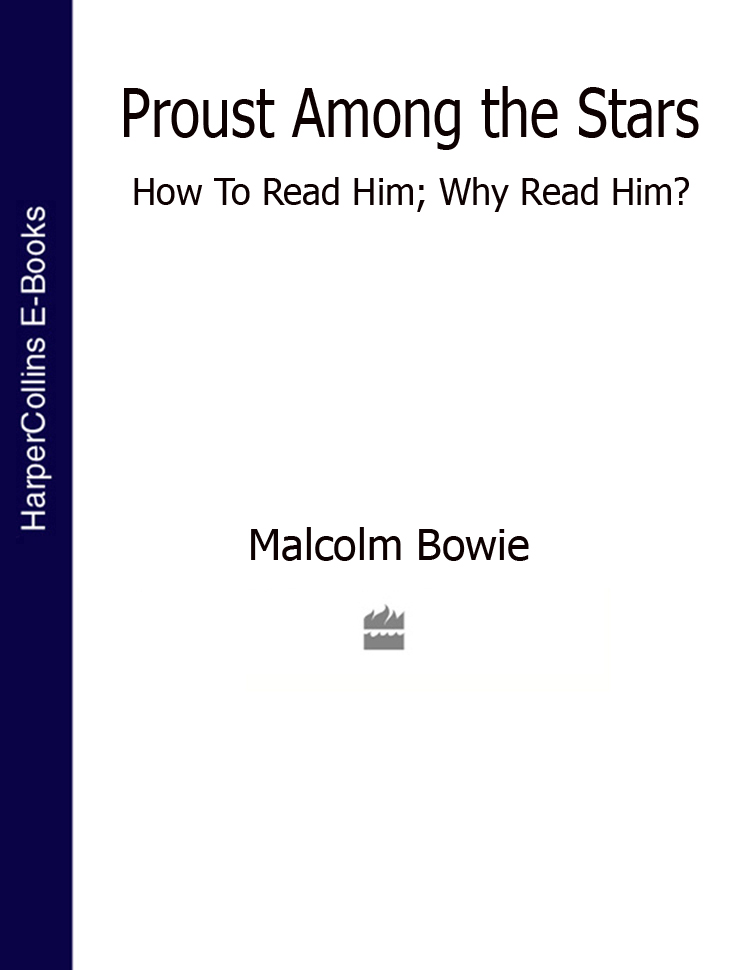Sind wir nicht auch ein Weltgebaude, so gut als der Sternenhimmel, und eines das wir besser kennen solten, und besser kennen knnten, sollte man denken, als das dort oben?
GEORG CHRISTOPH LICHTENBERG, Gedankenbcher
Are we too not a cosmic system, and one we know better, or at least ought to know better, than we do the heavenly firmament?
Notebooks
It would indeed give me a certain household joy to quit this lofty seeking, this spiritual astronomy, or search of stars, and come down to warm sympathies with you; but then I know well I shall mourn always the vanishing of my mighty gods.
RALPH WALDO EMERSON, Friendship
LET THE MILKY WAY BE SPLIT INTO THE MILKY WAY OF INVENTOR/EXPLORERS AND THE MILKY WAY OF INVESTOR/EXPLOITERS
VELIMIR KHLEBNIKOV, The Trumpet of the Martians
CONTENTS
My Proust quotations are taken from the new Pliade edition of A la recherche du temps perdu (4 volumes under the general editorship of Jean-Yves Tadi, Paris, Gallimard, 19879), and accompanied in my main text by volume number and page. English translations of each passage quoted are taken from C. K. Scott Moncrieffs version as revised by Terence Kilmartin, and further revised, to take account of the additions and corrections made by Tadi and his team, by D. J. Enright (6 volumes, Chatto and Windus, 1992), and again accompanied by volume and number and page. I have silently corrected a number of minor errors in this admirable English version.
The novel itself, and its component volumes, are referred to by their French titles throughout:
A la recherche du temps perdu (In Search of Lost Time)
Du ct de chez Swann (Swanns Way)
A lombre des jeunes filles en fleurs (Within a Budding Grove)
Le Ct de Guermantes (The Guermantes Way)
Sodome et Gomorrhe (Sodom and Gomorrah)
La Prisonnire (The Captive)
Albertine disparue (The Fugitive)
Le Temps retrouv (Time Regained)
This volume is subdivided into Combray, Un Amour de Swann (Swann in Love), and Noms de pays: le nom (Place-Names: The Name).
Sources for all other quotations and references are provided in the Notes section (below, pp. 32938).
Le seul vritable voyage, le seul bain de Jouvence, ce ne serait pas daller vers de nouveaux paysages, mais davoir dautres yeux, de voir lunivers avec les yeux dun autre, de cent autres, de voir les cent univers que chacun deux voit, que chacun deux est; et cela nous le pouvons avec un Elstir, avec un Vinteuil, avec leurs pareils, nous volons vraiment dtoiles en toiles.
MARCEL PROUST, A la recherche du temps perdu
The only true voyage, the only bath in the Fountain of Youth, would be not to visit strange lands but to possess other eyes, to see the universe through the eyes of another, of a hundred others, to see the hundred universes that each of them sees, that each of them is; and this we can do with an Elstir, with a Vinteuil; with men like these we do really fly from star to star.
In Search of Lost Time
When it comes to the lives and the living quarters of great writers, I have done my share of snooping. Prague beckoned me because it was Kafkas city, and Dublin because it was Joyces. To Monterey I went, my nostrils ready flared for the fish-stink of Steinbecks Cannery Row, and to Key West to booze in Hemingways favourite bars, and to Chawton in Hampshire to run a surreptitious hand across the table at which Emma and Persuasion were written. I have climbed Skiddaw in the footsteps of Keats, Helvellyn in those of Coleridge, and been driven by bus to the summit of Mont Ventoux, apologising self-importantly to the shade of Petrarch for not repeating the poets pedestrian ascent of 1336. In Ravenna I have paused before Dantes tomb, and in Stinsford churchyard before the last resting place of Thomas Hardys heart. Lisbon was Pessoa, Mexico City was Octavio Paz, and Athens became Thucydides for a moment when a taxi-driver spoke of him as if he were a still-living family friend.
I report all this scurrying about of mine without feelings of pride or shame, for tourism has always struck me as a harmless passion, and the literary pilgrimage in particular as the very model of a wholesome leisure pursuit. Besides, my journeys seemed always to enhance rather than damage the pleasures of reading: standing there in yuppified, odourless, modern Monterey, I began to thirst again for the exuberant low life that Steinbecks writing conjures into being; the very smoothness of Jane Austens table reminded me of all that was edgy and abrasive in her prose.
Those were my excuses anyway. And they left me ill-prepared for my most recent visit to Cabourg on the Normandy coast. I had known this unremarkable town long ago, and had grown accustomed to the huge hump of its Grand Hotel looming up through the autumn mists. Then as now the hotel was the only peculiarity of the place, but it was of a type that numberless small resorts to the east and west also boasted. I would have shrugged in lofty indifference if I had been told that Cabourg was the main model for Prousts enchanted Balbec, and would have refused to make any practical connection at all between the seaside temple to Eros that appears in his novel and the large commercial establishment perched greyly upon the promenade.
The first mistake I made, coming back to Cabourg after many years, was to order breakfast on the hotel terrace, alongside what was by then already known as the promenade Marcel Proust, and the second was to persuade myself almost successfully that I could see the celebrated little band of young girls flitting back and forth on the otherwise deserted beach. Here was perdition indeed for any serious admirer of Prousts A la recherche du temps perdu (191327). Here was a world of would-be Proustian experience that seemed not to require that the novel be read, a universe parallel to that of Prousts text and maintained in being by the combined forces of gossip, travelogue and voyeuristic biographical speculation. Just as no one need see King Lear performed to find out roughly what goes on in the play, no one need embark on Prousts long sentences and involved semantic textures to be charmed by Albertine and her friends, or by the petite madeleine, or by Mme Verdurins long climb from the bourgeoisie to the aristocracy. Knowledge of these things is amply available from commentaries on the novel; and Prousts life, including his summer holidays, has been turned into such convincing and accessible near-novels by biographers like Andr Maurois and George Painter that the alchemical transformation he himself performed on that life can easily seem slack and shapeless in comparison.
I began to know in Cabourg a fear that I had not known at any other of my literary destinations. This was the fear that I might lose a supreme work of literature and never get it back; that I would resign myself to a non-reading knowledge of the novel, a Proust of tea-parties and table-talk, of selected short quotations and haunting images that had long ago drifted free of their original textual moorings. Obvious truths suddenly needed restating: if Prousts life had been in some respects mad, his novel was madder; if Proust the man had been both a snob and an egalitarian, his novel pressed this contradiction to a point of sublime extremity; if homosexuality had brought everyday excitement and anxiety to Proust as a biographical subject, it had become exorbitantly fascinating to the novels narrator a spur to scientific curiosity, an endless adventure of the imagination, an Eleusinian mystery cult. Why settle for an ordinary writers life when this flagrant fiction was at hand? The little band were not Cabourg summer residents. The only place where Albertine and the others could live their Protean or Mephistophelian lives was on the farther shore of literary invention.

